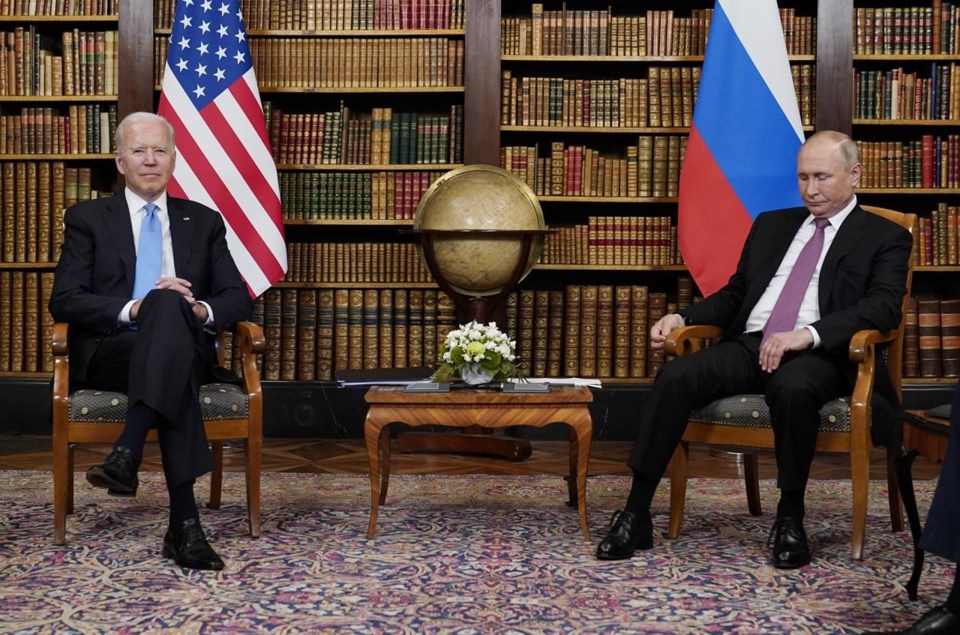WASHINGTON (AP) — A majority of U.S. adults expect America's relations with foreign adversaries like and to grow more hostile, according to a new poll, a major shift in public opinion from .
Two years into the Biden administration, 60% of U.S. adults say relations with adversaries will get worse, up from 26% four years ago at the same point in the Trump administration, according to the poll from the Pearson Institute and The Associated Press-NORC Center for Public Affairs Research. Just 21% say relationships with allies will deteriorate, down from 46% then.
In general, 39% expect the country’s global standing to worsen, compared with 48% who said that in 2018. Crucially, the United States’ own s influences views of the country’s standing abroad.
“Those results really, clearly show that it’s hyperpartisanship” affecting how confidently or bleakly, respectively, Democrats and Republicans see the U.S. standing abroad, said Sheila Kohanteb, a political scientist and executive director of the Global Forum at the Chicago-based Pearson Institute for the Study and Resolution of Global Conflicts.
In terms of the opinions that people in the U.S. are expressing on U.S. dealings abroad, the key factor is “political bloc sticking with political bloc,” Kohanteb said.
Four years ago, three-quarters of Democrats expected U.S. global standing to suffer. Now, roughly that same percentage see stability or improvement in the near future. By comparison, about 6 in 10 Republicans predicted improvements in 2018; now that same percentage expect the current administration to stumble.
Other countries are “probably laughing at us, waiting for us to fall apart,” said Kristy Woodard, a 30-year-old Republican in Winston-Salem, North Carolina. She said she saw the economy and U.S. leadership as suffering under President Joe Biden.
“I don’t think we really have allies anymore because the United States is just a joke at this point,” Woodard said.
But David Dvorin, a 49-year-old Democrat in Pittsburgh who works as a price specialist, said Biden was winning respect abroad by rallying international allies to respond to Russian President Vladimir Putin’s invasion of Ukraine.
“The war in Ukraine has shown the leadership of the Biden administration, to be able to hold most of Europe together,” Dvorin said.
Still, as Russia amps up its assault on Ukraine, tensions with China grow over Taiwan and other issues and the U.S. confronts North Korea and Iran over those countries' nuclear programs, similar percentages of Republicans and Democrats say that relationships with adversaries will get worse in the next year.
The Pearson Institute/AP-NORC poll also shows strong support for a U.S. foreign policy that protects women and minorities around the world — even though few people think the U.S. is doing a world-beating job of protecting those same interests at home.
Majorities of U.S. adults said they see preventing discrimination against women and minorities around the world as an important U.S. foreign policy goal and that the U.S. government has significant responsibility for protecting the rights of those groups. And 78% of people in the United States believe the U.S. should withhold financial support from other countries that are failing to protect the rights of women and minority groups.
However, only about 1 in 5 U.S. adults thinks the country is leading the world in safeguarding the rights of women and racial, ethnic and religious minorities, or LGBTQ people. Many think the U.S. is among several countries that are doing it well, but about a third say there are other countries doing better.
Rick Reinesch, 61, of Austin, Texas, who works as a project manager for a consulting firm and describes himself as a Democratic-leaning political independent, calls safeguarding the freedoms of women and minorities abroad “essential” for the U.S.
But the increasing Republican and Democratic divide at home means Americans' performance on that point is a “mixed bag,” with rights deteriorating in states most influenced by former President Donald Trump's dismissive outlook, he said.
Chris Ormsby, 53, of Edmond, Oklahoma, an administrator in higher education who describes himself as a political independent, pointed to women's rights in Iran, where women are spearheading weeks of protests triggered by government demands that women cover their hair, as among the rights issues playing out overseas.
“Maybe we can take more proactive steps” abroad on that, Ormsby said. But “I think there's other things to worry about, nuclear proliferation and things like that.” He called slowing climate change by moving the world away from fossil fuels a priority for U.S. policy abroad.
That all makes for a strange split for those charged with shaping America's policy on protections of human rights, Kohanteb, the Pearson Institute official, said.
“American policy is not as adamant about protecting our own rights as Americans believe we should be doing abroad,” she said.
___
Dolby reported from New York.
___
The poll of 1,003 adults was conducted Sep. 9-12 using a sample drawn from NORC’s probability-based AmeriSpeak Panel, which is designed to be representative of the U.S. population. The margin of sampling error for all respondents is plus or minus 4.0 percentage points.
Ellen Knickmeyer And Nuha Dolby, The Associated Press



